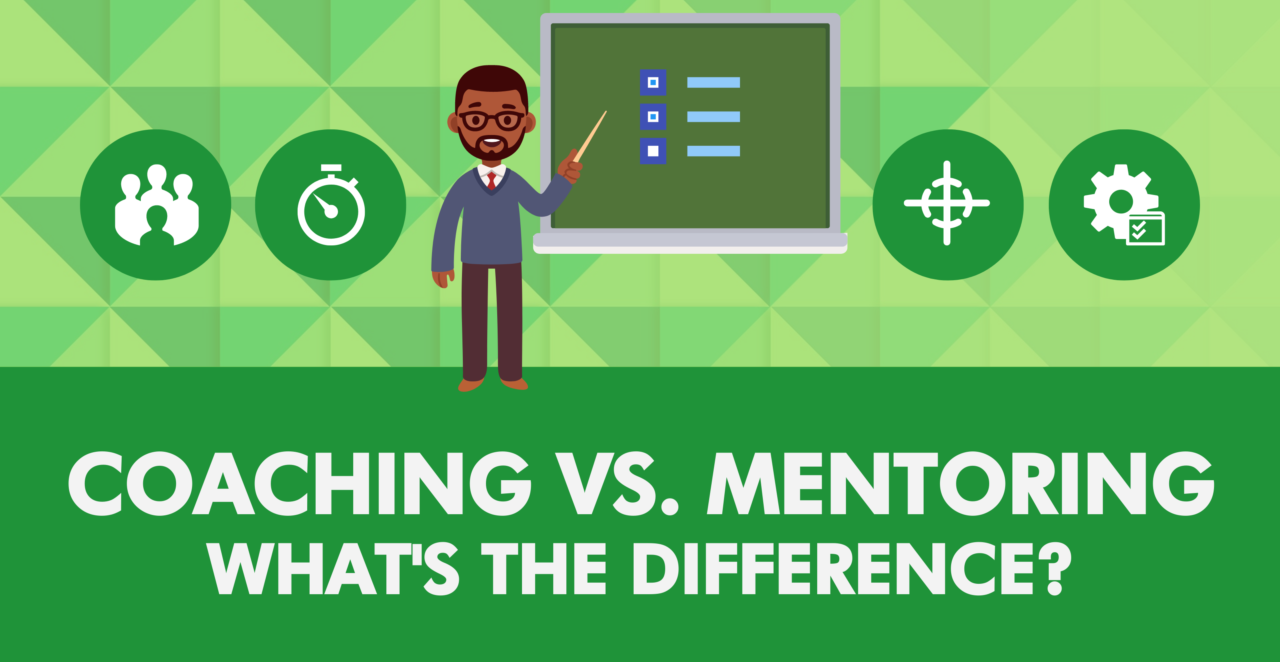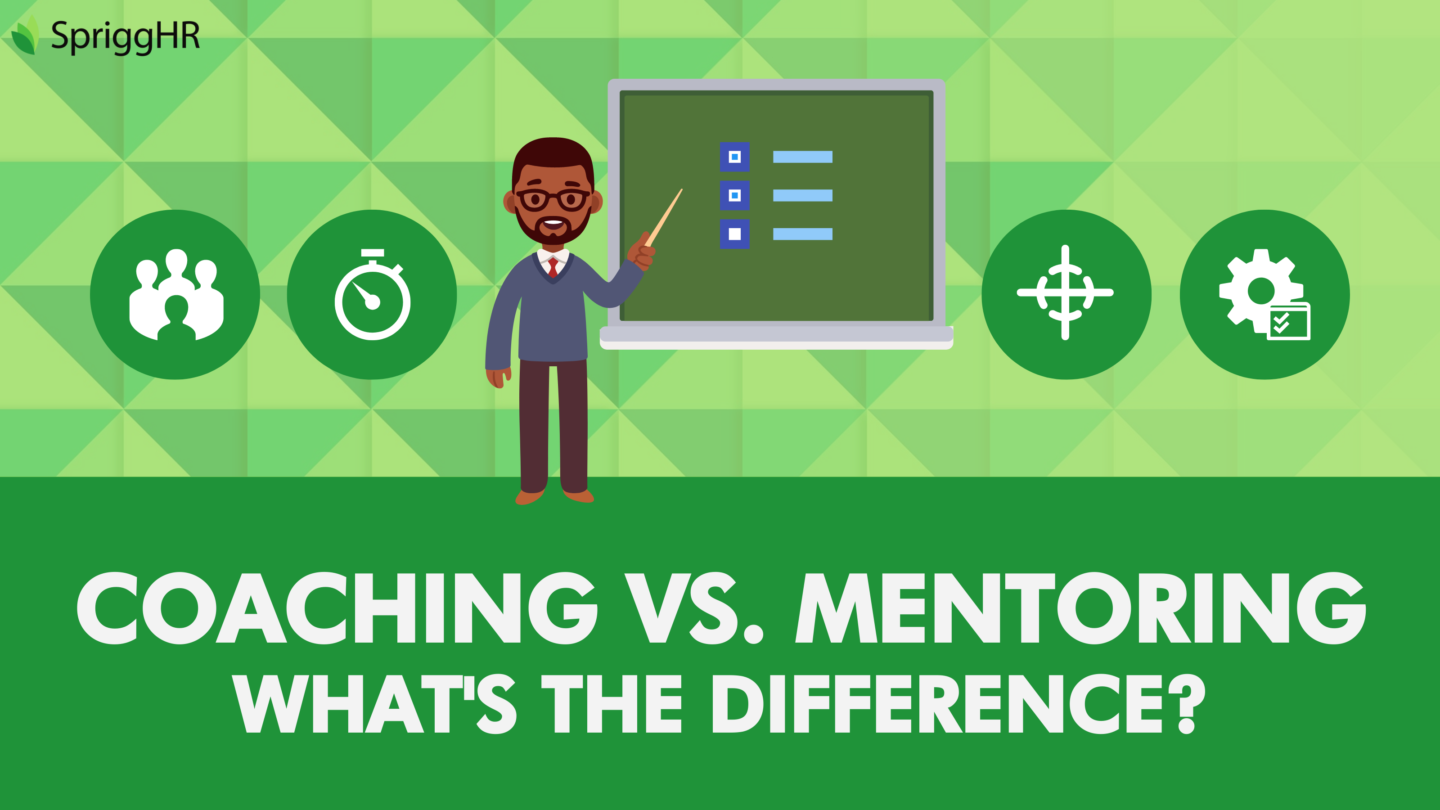
Coaching vs Mentoring: What’s the Difference?
The coaching vs mentoring comparison may seem trivial, as both are techniques used by management to drive desirable workplace behaviour and support the personal and professional growth of employees. However, the terms are not interchangeable.
Coaching vs Mentoring – How to Differentiate
A general way to differentiate between coaching vs mentoring is to think of coaching as a short-term task and mentoring as a longer-term relationship.
Specifically speaking, the International Mentoring Group (IMG) defines mentoring as, “A process of direct transfer of experience and knowledge from one person to another.” In a workplace, a mentor would aim to provide guidance and direction to a mentee. Mentees are usually junior-level employees with similar interests, who likely aspire to the position of the mentor. The mentor is someone who has achieved success within their industry and position, and voluntarily shares their expertise.
IMG defines coaching as, “a method of achieving set goals.” A coach does not necessarily have to be a company employee. Business coaches may be hired externally, in which case organizations need to carefully consider the effectiveness of their hired coach. Coaching may also take place internally, where business coaches are other experienced staff members. A business coach helps their clients achieve specific, immediate goals, as defined by the organization.
Companies can benefit from both mentors and coaches. Understanding the distinction between these two models are essential, especially when considering which approach will yield the best results for your organization.
Key Differentiators
1. Orientation
Mentoring is oriented around relationships. A mentor and a mentee might choose to focus on certain goals or competencies, but over time, they should develop a bond and rapport that transcends workplace issues and learning goals.
Coaching is oriented around defined tasks. Coaches are often used when individual employees, usually company managers or leaders, want to become more proficient in certain areas or address certain skills in which they might be lacking.
2. Drivers
Mentoring is development driven. Mentoring focuses on the future, the mentor sharing their own experience in an effort to positively influence the growth of their mentee, both personally and professionally.
Coaching is performance-driven. Coaching focuses on the present, its purpose is to improve, ameliorate, or develop new actionable skills that can be leveraged immediately in order to yield results.
3. Duration
Mentoring requires a large time commitment from both parties. While mentors and mentees may begin as acquaintances, consistent meetings over a long period of time often leads to strong fellowships that grow and continue for years.
Coaching has a defined endpoint. It is not necessarily a contractual agreement, but coaching does have a termination point, usually when the trainee masters the specific skill or goal they were working on.
4. Input from Leadership
Mentoring requires little oversight. A manager may be assigned to administer the logistics of mentoring programs, but actual formal supervision throughout the process is rarely required. Mentors and mentees themselves are responsible for steering the direction of their relationship.
Coaching requires active engagement. Since the coach is providing actionable tips of improving skills that will benefit the organization short-term, a manager should monitor the process, solicit regular feedback, and can even determine when the coaching initiative should conclude.
5. Evaluation
Success in mentoring is measured in broad terms. The benefits of coaching can include improved morale or lower turnover, but not all successes are easy to measure. Organizations often turn to specific key performance indicators (KPIs) to measure results of an initiative, but mentoring should be measured in broader terms.
Measurement in coaching is much more accessible. Specific goals behind a coaching initiative are defined at the get-go, making the accomplishment of these goals easy to track and measure.

Coaching vs Mentoring
| Mentoring | Coaching |
| Ongoing relationship that can last for a long period of time. | Relationship with a set duration. |
| More informal. Meetings can take place as and when the mentee needs advice, guidance, or support. | More structured. Meetings are scheduled on a regular basis. |
| Long-term, considering a broader view of the client. | Short-term (sometimes time-bounded), considering specific development areas/issues. |
| Mentor is usually more experienced and qualified than the mentee. They are often a senior staff member in the organization who can share their knowledge and experience, and open doors to out-of-reach opportunities. | Coaching does not have to be performed on the basis that the coach has direct experience of their client’s occupational role, unless the coaching is specific and skills-focused. |
| Focused on career and personal development. | Focused on development and issues at work. |
| Agenda determined by the mentee – the mentor provides support and guidance to prepare them for future roles. | Agenda is curated to help the client achieve their specific, immediate goals. |
| Revolves around developing the mentee’s professional career. | Revolves around specific development areas and issues. |
Depending on the situation, one approach may be preferable over the other. In order to determine whether the services offered by coaching vs mentoring will be more beneficial to your needs, consider the following recommendations:
You should consider mentoring when…
- The company wants to develop promising internal talent.
- There is a shortage of potential leaders in the corporate pipeline.
- The organization wants to remove the barriers that inhibit the advancement of certain groups.
- It becomes important to preserve internal expertise and knowledge as part of the organization’s succession planning.
- Established senior leaders are altruistically motivated to give back.
You should consider coaching when…
- Talented employees are not meeting expectations.
- Team members need to acquire or master specific skills or competencies to succeed.
- The organization needs to improve its performance in a short period of time.
- The company is introducing a new system or program.
- A subdivision of the organization is attempting something new or untested.
Final Thoughts
At first glance, coaching and mentoring seem similar. They are two management techniques that often overlap in their general aim but should not be confused with one another. While similarities do exist between them, there are also significant differences, differences that should be thoroughly understood in order to be able to choose the best course of action for your organization.
“A coach has some great questions for your answers; a mentor has some great answers for your questions.” – Brefi Group, a UK-based change-management organization.




